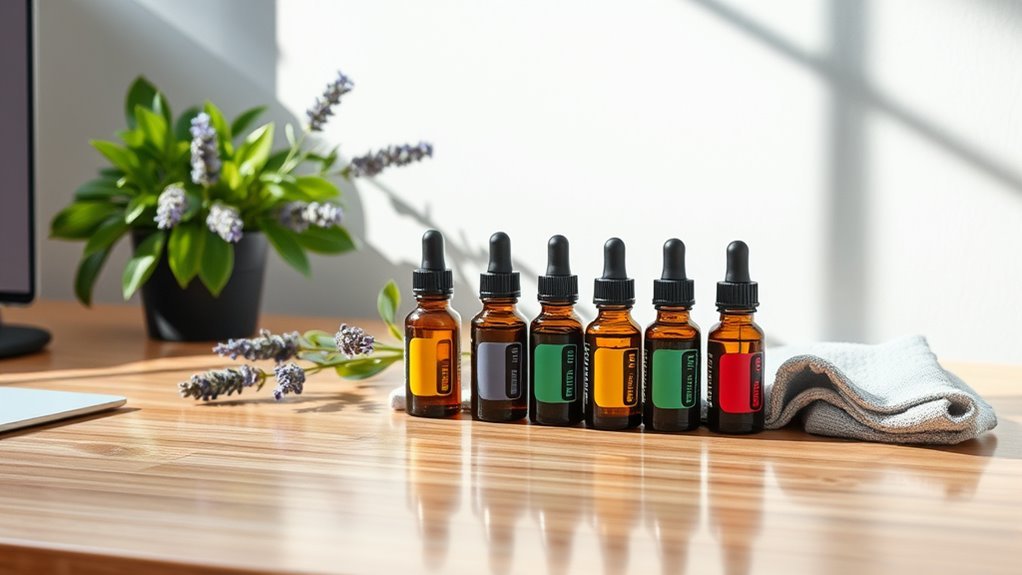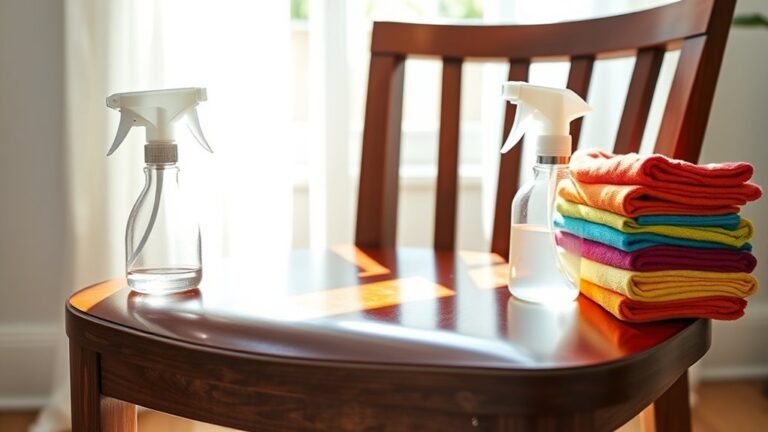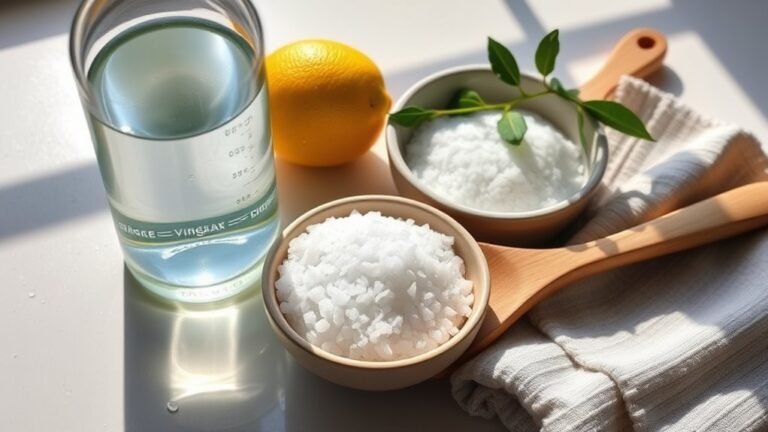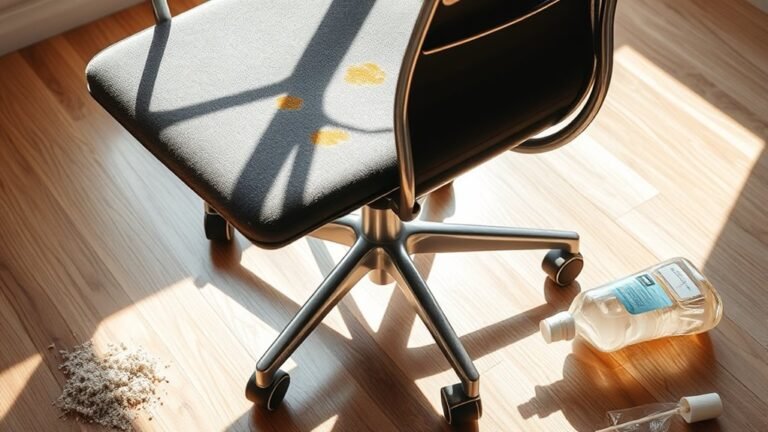Using Essential Oils to Clean Desk
You can clean your desk naturally by using essential oils like tea tree, eucalyptus, or lemon, which have proven antimicrobial properties to reduce bacteria and fungi. Mix 10-15 drops with distilled water and a natural emulsifier for an effective spray. These oils also improve air quality and boost focus while avoiding harsh chemicals. Always dilute properly and test on small areas. Exploring this method further reveals detailed preparation, safety, and workspace benefits.
Benefits of Using Essential Oils for Desk Cleaning
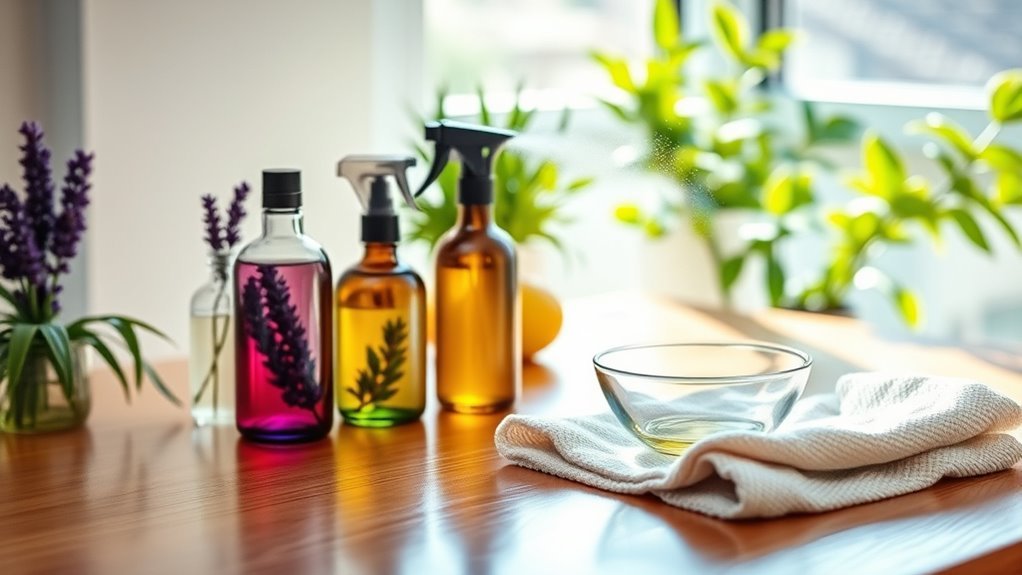
Although traditional cleaning products are effective, using essential oils for desk cleaning offers unique benefits that enhance both hygiene and well-being. When you incorporate essential oils, you gain natural antimicrobial properties that reduce pathogens without harsh chemicals, promoting healthier indoor air quality. This directly contributes to the health benefits you experience, minimizing exposure to irritants and allergens. Furthermore, the aromatic compounds in essential oils have been scientifically linked to a productivity boost by improving focus and reducing stress. By choosing essential oils, you create a cleaner, safer workspace that supports your mental clarity and physical health simultaneously. This approach aligns with your desire for freedom from synthetic chemicals, providing an effective, natural strategy to maintain cleanliness and optimize your work environment. However, it is important to use essential oils properly diluted and avoid direct application on sensitive surfaces to prevent damage, as outlined in guidelines for proper oil use.
Best Essential Oils for Disinfecting and Freshening
When selecting essential oils for disinfecting and revitalizing your desk, it’s important to focus on those with proven antimicrobial properties and pleasant aromas. Tea tree oil is highly effective due to its strong disinfecting properties against bacteria and fungi. Similarly, eucalyptus oil offers broad-spectrum antimicrobial effects while providing invigorating revitalizing scents. Lemon oil not only kills germs but also leaves a clean, citrus aroma that promotes a sense of freedom and clarity. Lavender oil is another excellent option, combining mild disinfecting properties with calming revitalizing scents ideal for reducing stress. By choosing these essential oils, you harness natural compounds that guarantee effective surface cleaning and a revitalizing environment, empowering you to maintain a healthier, more vibrant workspace effortlessly. Additionally, using these oils supports biodegradable materials that prevent pollution and protect ecosystems.
How to Make an Essential Oil Cleaning Spray
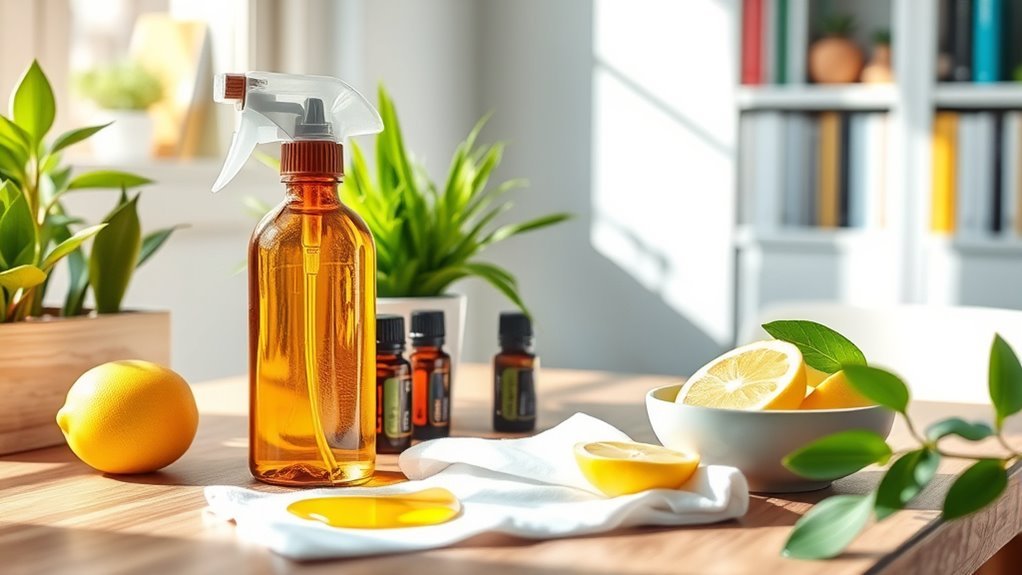
To create an effective essential oil cleaning spray, you’ll need distilled water, a carrier like witch hazel or alcohol, and your chosen essential oils. Combine these ingredients in a spray bottle following specific ratios to guarantee proper dilution and efficacy. Once mixed, you’ll learn how to apply the spray safely and maximize its disinfecting and freshening properties on your desk. Using tea tree oil in your spray can provide antibacterial and antifungal benefits for a cleaner workspace.
Ingredients Needed
Three key ingredients are essential to create an effective essential oil cleaning spray for your desk: distilled water, a natural surfactant like castile soap, and your choice of essential oils known for their antimicrobial properties. Distilled water guarantees purity, preventing contaminants that could diminish cleaning efficacy. Castile soap acts as a gentle, natural ingredient that breaks down oils and dirt without harsh chemicals. For antimicrobial potency, select essential oils such as tea tree, eucalyptus, or lavender, which scientifically demonstrate bactericidal effects. These natural ingredients combine to form a cleaning solution that’s both safe and effective, offering you freedom from synthetic additives. By understanding each component’s function, you can tailor your spray to suit your preferences and maintain a hygienic workspace with confidence.
Mixing Instructions
Start by measuring 1 cup of distilled water into a clean spray bottle to guarantee purity and prevent contamination. Next, follow these precise steps for ideal mixing ratios and oil combinations:
- Add 10-15 drops of your chosen essential oils, balancing antibacterial properties (like tea tree) with invigorating scents (such as lemon or eucalyptus).
- Incorporate 1 tablespoon of a natural emulsifier, like witch hazel or vodka, to ensure the oils disperse evenly in the water.
- Secure the spray bottle cap tightly and shake vigorously for 30 seconds to blend the solution thoroughly.
This method respects the scientific principles behind essential oil dilution and emulsification, empowering you to create an effective, customizable cleaning spray tailored to your desk environment.
Usage Tips
Although essential oils offer natural cleaning benefits, you’ll need to apply your spray correctly to maximize its effectiveness and maintain surface integrity. Start by shaking the bottle well to evenly distribute aromatic blends before each use. Lightly mist the spray onto a microfiber cloth rather than directly on your desk to prevent over-saturation and potential damage. Incorporate this into your cleaning rituals consistently, allowing the oils’ antimicrobial properties to work while infusing your workspace with invigorating scents. Avoid using on delicate wood finishes without testing a small area first. Store your spray in a cool, dark place to preserve oil potency. By following these precise steps, you guarantee your essential oil cleaning spray performs at its best, providing a safe, fresh, and efficient method to maintain your desk’s cleanliness and your workspace’s freedom-enhancing atmosphere.
Step-By-Step Guide to Cleaning Your Desk With Essential Oils

A well-structured approach is crucial when using essential oils to clean your desk effectively. Begin by removing all items to facilitate thorough cleaning and improve desk organization. Next, prepare an essential oil blend by mixing 10 drops of lemon oil, 5 drops of tea tree oil, and 5 drops of lavender oil in a spray bottle filled with water. Finally, lightly spray the solution onto a microfiber cloth and wipe all surfaces, paying close attention to high-touch areas. This method guarantees effective disinfection and leaves a fresh scent without damaging materials. By following these precise steps, you maintain a clean, organized workspace that promotes freedom and productivity through the natural power of essential oils. Remember to use proper dilution to ensure safety and effectiveness when applying essential oils in your cleaning routine.
Safety Tips When Using Essential Oils for Cleaning
Three vital safety considerations must guide you when using essential oils for cleaning to prevent adverse reactions and guarantee effective use. First, always dilute essential oils with a carrier like water or vinegar; undiluted oils can cause skin irritation or damage surfaces. Second, secure proper ventilation during and after cleaning to avoid respiratory irritation from concentrated vapors. Third, keep essential oils out of reach of children—this is essential for children safety—as ingestion or skin contact can be harmful. Additionally, test any oil mixture on a small, inconspicuous area of your desk first to check for adverse reactions. By adhering to these essential oil precautions, you maintain both your freedom to clean naturally and the safety of your environment. Choosing products with natural antibacterial properties can enhance cleaning effectiveness while ensuring safety.
Enhancing Your Workspace Atmosphere With Essential Oils
When you incorporate essential oils into your workspace, you can influence both the environment and your cognitive function. Enhancing your workspace ambiance through scent therapy creates a more productive and enjoyable setting. Here’s how you can do it effectively:
- Select oils known for cognitive benefits, such as rosemary for focus, peppermint for alertness, and lavender for stress reduction.
- Use a diffuser to disperse the aroma evenly, maintaining a balanced scent concentration that avoids overwhelming your senses.
- Rotate essential oils periodically to prevent olfactory fatigue and sustain the workspace’s invigorating atmosphere.
Frequently Asked Questions
Can Essential Oils Damage Electronic Devices on My Desk?
You should be cautious using essential oils near electronic devices, as their chemical compounds can potentially harm sensitive components. Essential oils contain volatile substances that might degrade plastics, coatings, or seep into openings, causing corrosion or malfunction. To protect your devices, avoid applying oils directly onto surfaces; instead, dilute them or use a cloth slightly dampened with diluted solution. This way, you maintain cleanliness without risking damage to your electronics.
How Often Should I Clean My Desk Using Essential Oils?
You should adjust your cleaning frequency based on how often you use your desk and the level of dirt buildup. Typically, cleaning once a week is sufficient to maintain hygiene while enjoying essential oil benefits like antibacterial properties and a pleasant scent. Over-cleaning might diminish the oils’ effectiveness or affect surfaces. Stay consistent but avoid excessive use to keep your workspace fresh, safe, and supportive of your freedom to focus.
Are Essential Oils Safe for Use Around Pets in the Office?
When considering pet safety in your office environment, you should know that many essential oils can be toxic to pets, especially cats and dogs. Even small amounts can cause respiratory distress or skin irritation. To keep your workspace safe, avoid diffusing oils like tea tree, eucalyptus, or citrus around pets. Always opt for pet-safe alternatives, use oils sparingly, and guarantee good ventilation to maintain a healthy, free office space without compromising your pets’ well-being.
Can Essential Oils Help Reduce Dust Accumulation on My Desk?
It’s interesting you ask about dust repellent properties because some essential oil blends do exhibit them. While they don’t create a physical barrier, oils like eucalyptus and lemon can reduce static cling, helping dust settle less on surfaces. When you apply these blends diluted in water for cleaning, you might notice less dust accumulation on your desk over time. Still, combining oils with regular cleaning guarantees the best freedom from dust build-up.
What Is the Shelf Life of an Essential Oil Cleaning Spray?
You’ll find that the shelf life of an essential oil cleaning spray typically ranges from six months to a year. This depends on essential oil potency and the spray’s ingredients—citrus oils usually degrade faster, while oils like eucalyptus last longer. Since essential oils are volatile, their cleaning power diminishes over time. To maintain effectiveness, store your spray in a cool, dark place and use opaque containers to preserve potency.
